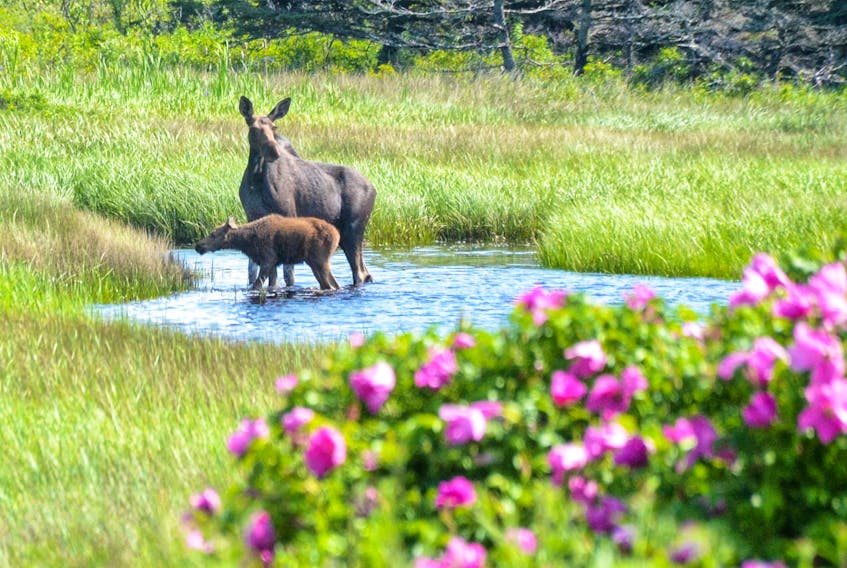ST. JOHN'S, N.L. — Moose are apparently devouring vegetable crops in some parts of the province, and farmers claim a change in provincial policy removes their long-standing right to shoot the moose at night.
Kent Fudge of Wooddale in central Newfoundland and Labrador said he lost $5,000 worth of cabbage in a single night. The moose take bites out of each cabbage, rendering them unsellable, he said.
‘It doesn’t take long to lose a lot of acreage,” Fudge said.
“Basically, they are putting farmers out of business.”

The moose also go for turnips, broccoli and carrot tops, which then makes using a mechanical carrot harvester impractical, Fudge said.
"Once they know it is there they come back every single night."
Fudge said he learned of the policy when he recently went to get a nuisance licence. Fudge — who has been farming on his own for 23 years and comes from a farming family — explained that in the past farmers could watch over their the fields at night with big, bright lights and when they caught the massive vegetable bandits in the act, they could shoot them, following a set of rules.
The rules, according to Fudge, included alerting wildlife officials of the kill, and then a moose-licensed hunter would be brought in to retrieve the meat so it didn’t go to waste.
He said farmers have always been careful and conscious of their surroundings when taking shots at moose.
“The problem with farming in Newfoundland is there’s no real big fields. There’s a lot of smaller fields everywhere,” Fudge said, noting fencing does not deter the moose.
Neither do electric fences — it just makes them run faster, he said, explaining they are used to running through rough brush and trees.
Noisemakers or other distractions will work for a night or two and then the moose get used to them and ignore the deterrence, he said.
Fudge said he has even tried leaving his tractor running in the field to scare moose off. He has also left a radio playing loudly in the field, but that doesn't work long, nor does a device that mimics the sound of a loud gunshot.
“Unless I pay somebody to go in and stand up all night long to make noise, who is going to do that?” Fudge said of the conundrum.
He said in a typical year, he might kill multiple moose roaming his fields. The fields are also situated far apart — 15-16 kilometres — so he wouldn’t be able to run around all night from field to field, chasing off moose.
“How are you supposed to harvest during the daytime? You have to sleep sometime,” Fudge said.
"Once they know it is there they come back every single night." — Kent Fudge
Other than the crops that the marauding moose love, Fudge said, he only plants a small amount of lettuce and some potatoes.
“The lettuce is only a joke and you can’t survive on potatoes,” Fudge said.
“They’re going to put me under. It’s a drastic thing they got done.”
Mount Pearl Progressive Conservative MHA Jim Lester, a farmer by trade, said he has been looking into the issue and has tried to get answers from the Department of Fisheries and Land Resources, with no response.
Lester, like Fudge, said moose get accustomed to the noisemakers and fences, and ignore them.
He said if the province is concerned about safety, that can be mitigated with additional training, or regulations that require farmers to use weapons like shotguns rather than high-powered rifles.
Lester said it’s wrong to leave farmers without anything to battle the moose.
“It puts (the farmers) at considerable risk,” Lester said.
Fisheries and Land Resources — asked Thursday to verify the policy change — said they could not respond to The Telegram’s inquiry until Friday.
UPDATE:
Farmers who discover moose destroying their crops at night must call in a conservation officer to kill the animal, says Fisheries and Land Resources Minister Gerry Byrne.
Friday morning, Byrne told The Telegram that provincial legislation banned night hunting in 2016, and that change removed an exception for farmers that had existed allowing them to kill moose at night if they were on their land destroying their crops.

Byrne said the change in legislation came about because of general public concerns about firing high-powered rifles at night.
Byrne said conservation officers are on call 24-7, 365 days a week.
“The response time of the officers is quick,” he said.
If they have to kill a moose on a farm, the meat would then be passed on to someone on a list who can’t hunt because of disability.
This balance of having the conservation officer respond protects both the farmer and the public, Byrne said.
He said there’s thankfully been no reports over the years of a farmer injuring a person or property when shooting a moose, but it’s about being proactive rather than reactive.
“One never knows why a rifle is being fired, so that obviously causes a concern,” he said of the public not being in the loop that the shot they are hearing is from a farmer on a field.
Byrne said the issue of moose destroying crops is “not a widely-held concern within the farm community.”
He said farmers can put fencing up with the assistance of agriculture funding arrangements.
Byrne also noted the Farmer’s Protection Act protects both the interests of the farmer and the public, citing a recent decision on the northeast Avalon that instructed a farmer to stop turning on bright lights at night on a greenhouse near a residential area. He speculated the moose killing might have the same result if given the same test.
As for why the policy change in 2016 did not resonate until this year, Byrne suggested it’s because the moose problem is not frequent.
As for the suggestion that lower-powered rifles be allowed, Byrne noted slugs in a shotgun are a permitted method for hunting moose, but that does not resolve the noise/personal security alarm issues surrounding the discharge of firearms at night.
It also may not be humane.
“Aiming a gun at night does cause a potential issue of accuracy. To kill a moose, accuracy of hitting the vulnerable zones of the animal to ensure quick dispatch is important,” Byrne said.
“Conservation officers would only dispatch a moose at night with a shotgun and slug if they had reasonable high confidence of a successful hit in the kill zone.”
Twitter: @BarbSweetTweets
RELATED









